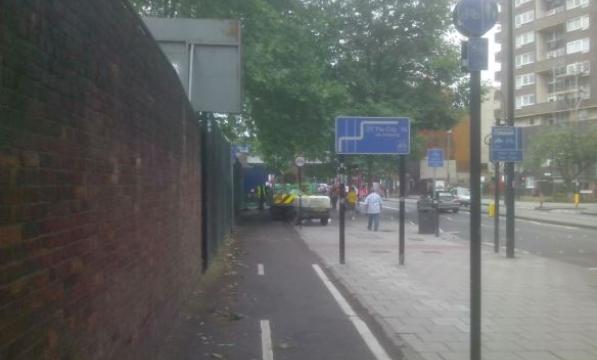“Pointless” prosecution of helmet-cam cyclist dropped, but ‘Justice for Michael’ quest continues

Kristian& Gregory was stopped and fined on 3 July 2014, by a PCSO taking part in the Metropolitan Police’s Operation Safeway. This operation was after a horrific spate of six London cyclists’ deaths in 13 days during November 2013. Between then and last July, the Met issued £50 fines to nearly 10,000 cyclists.
Later that day, Gregory published his helmet-camera footage of the incident, showing how he had moved to the right-hand side of the pavement as he approached a cycle track crossing of the New Kent Road, south London. The PCSO fined him, saying that he had moved across the white line too early.
However, CTC’s Cyclists’ Defence Fund (CDF) stepped in to support Gregory’s claim that prosecuting him was not in the public interest and that the contradictory signing at this location makes it impossible to tell what is legal – or indeed whether cyclists have any legal right to use the signed crossing at all. Gregory has since stood for and been elected to CTC Council to represent CTC’s members in London.
His case was due to be heard tomorrow (5 February) by Bexley Magistrates Court. However, the CPS wrote to him yesterday, saying it was discontinuing the case, having accepted that it was “not in the public interest”.
The decision comes as new Government figures show a 4% increase in road crash injuries in the year to September 2014, compared with the same period a year earlier. Serious injuries over this period increased by 5% and deaths by 1%.
Cyclists fared worse, with an 8% increase in fatal and serious injuries. Comparisons with past years indicate that, even allowing for increased cycle use, the risk per mile of suffering a cycling injury (and particularly a serious injury) has been increasing since about 2008.
The CPS’s initial decision to prosecute Gregory, despite objections from the local councillor in charge of transport, is in stark contrast to the legal system’s response to the death of cyclist Michael Mason (70). Mason was hit from behind by a car on Regent Street on 25 February 2014, dying 19 days later.
Despite the driver admitting at inquest that she could not explain her failure to see him when he was right in front of her, the police have not referred the case to the CPS. While correspondence is still ongoing with the police and CPS, CDF has now launched a £30,000 funding appeal in preparation for a possible legal challenge.
Meanwhile an inspectorate ‘watchdog’ report sharply criticised the police and CPS yesterday over their handling of fatal road crash cases. It particularly highlighted a lack of training for CPS staff and inadequacies in the provision of victim support.

